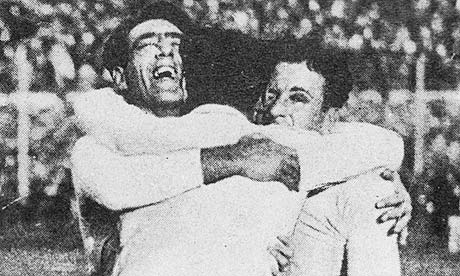Stobzilla
Adores babies
Leave Hatzi alone 
I think these are the ones still looking for players.
What/Who are we waiting for? Everyone has minimum 11, I see.
Just looked at the rosters and outstanding bids. Is it me or @Stobzilla is like a kid in a candy shop?
Lorenzo Fernández
May I suggest a fourth Peruvian winger? Or his partner in crime who has been horrendously overlooked here? Top scorer in the Copa Libertadores' history apparently counts for nothing if you just happen to be born in Ecuador. No, let's pick Henrik Larsson instead because, you know, the Scottish Premier League is in Europe and the Libertadores isn't. Yes, great strikers around, no constraints and most looking at playing with just one, but he still improves at least three if not five of the teams out there.
There are much better strikers still out there that are 100 times better than Larsson though...Dont be running larsson down because he played in scottish league.. he played for barcelona was fantastic, his few games with us he was very good rooney said he best strike partner hes had at one stage. And on international stage larsson scored for fun too..
There are much better strikers still out there that are 100 times better than Larsson though...
Wouldnt say 100 times. Still a quality quality striker. I picked players I am familiar with as well to make it easier to debate and fit them into certain systems.
I figured that was the case, but there's absolutely no doubt there are better players available who can do everything he did and fit into the systems he would, and do it better. I've strongly considered Larsson in other drafts and do rate him, but he doesn't really belong here. I would get it if it were a budget thing, but truckloads of football greats are going for 10M a pop.
Wouldnt say 100 times. Still a quality quality striker. I picked players I am familiar with as well to make it easier to debate and fit them into certain systems.
im just curious how will you debate about Duncan
As for Larsson, he is fine....you could probably do better but as you say, you are familiar with him so its a logic choice. Not sure why are they picking on you as there are few players who are much worse then Larsson and nobody said a word
MDFC
Stob
Crappy
Sjor
I think these are the ones still looking for players.
Managers who are done with bidding :
1. Aldo
2. Rpitroda
3. Berbasloth4
4. Raees
5. green_smiley
6. joga bonito
7. ChrisG11
8. Cal?
9. Marty1968
10. EAP. Kocsis is the last I need
11. Crappy
12. Skizzo



 ) was: "Football players... We build them up to be superhumans above us mere mortals, it gets to their head, and they forget how vulnerable they are to the fickle nature of fans and the greater political nous of their masters. Here lies Lorenzo Fernández, his reputation in tatters for displaying the same pig-headedness that always served him so well in a different arena". Some things never change.
) was: "Football players... We build them up to be superhumans above us mere mortals, it gets to their head, and they forget how vulnerable they are to the fickle nature of fans and the greater political nous of their masters. Here lies Lorenzo Fernández, his reputation in tatters for displaying the same pig-headedness that always served him so well in a different arena". Some things never change.
 .
.

 From the almighty hush in the stadium, it's already clear that nobody in Brazil seriously countenanced defeat.
From the almighty hush in the stadium, it's already clear that nobody in Brazil seriously countenanced defeat. 

 .
.All these great write ups...then I'll come in.
"Yeah Gullit, he was a bit of alright".
 . I wonder how many contemporary European managers started having their players doing chicken runs.
. I wonder how many contemporary European managers started having their players doing chicken runs.L'Equipe Editor Gabriel Hanot said:The Uruguayans are supple disciples of the spirit of fitness rather than geometry. They have pushed towards perfection the art of the feint and swerve and the dodge but they also know how to play directly and quickly. They are not only ball jugglers. They created a beautiful soccer, elegant but at the same time varied, rapid, powerful, effective. Before these fine athletes, who are to the English professionals like Arab thoroughbreds next to farm horses, the Swiss were disconcerted.
An anecdote from Ghiggia I remembered whilst on the subject of Maracanazo:
Spring 2000. While he travels to Brazil, Alcides Ghiggia present his passport in Rio de Janeiro airport. Facing him, a young woman of twenty years. She looks at the paper, staring at his interlocutor. "There is a problem," he asks? "Are you THE Ghiggia?" Questioned the girl. "Yes, it's me, he said, surprised. But 1950 was there a long time." Then, hand on chest, she launched her: "In Brazil, we feel in our hearts every day."
Nuts!
Strange to register some of the omissions here. There had to be omissions, don't get me wrong, there are a lot of great footballers out there in that all-time pool and 12 X 16 or thereabouts ain't all that many.
But given what people have actually picked up, there are some names which I just can't fathom nobody has been keen on.
One in particular who struck me earlier today – I was sure I had simply missed him, glancing over the rosters...but no. He ain't there.
Another one too – easy as hell to sell on here of all places, and undoubtedly better in every respect than several players who have been picked in his position.
And then there's...feckin' hell, that's just...insane...
